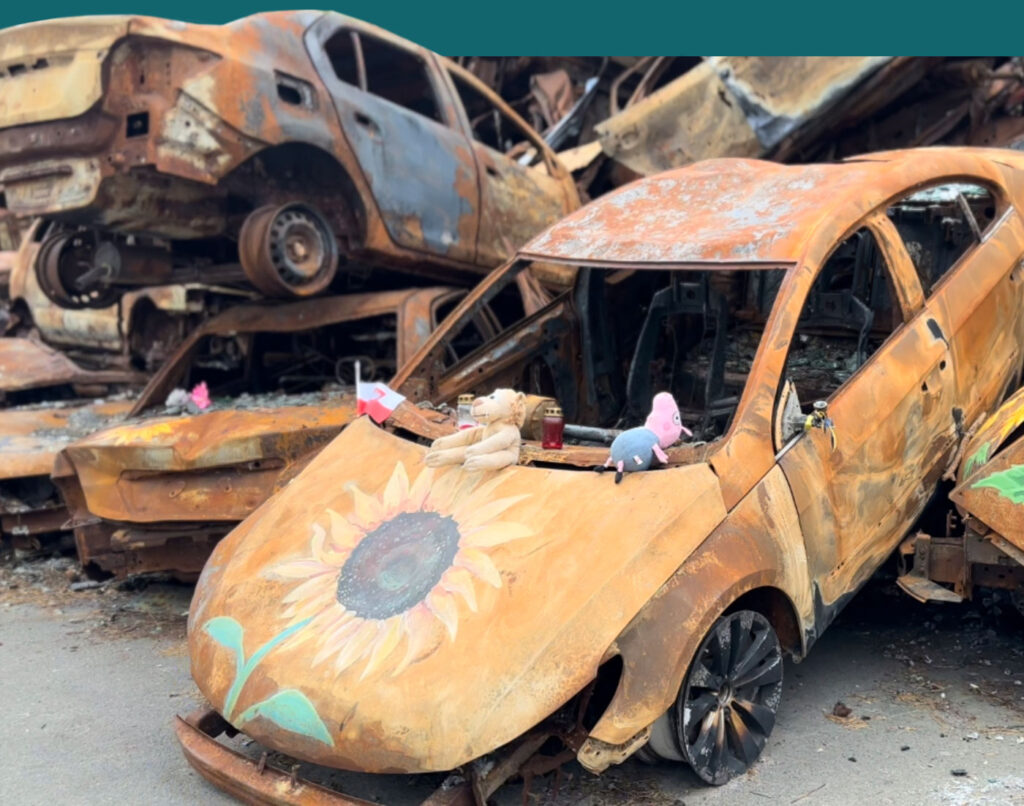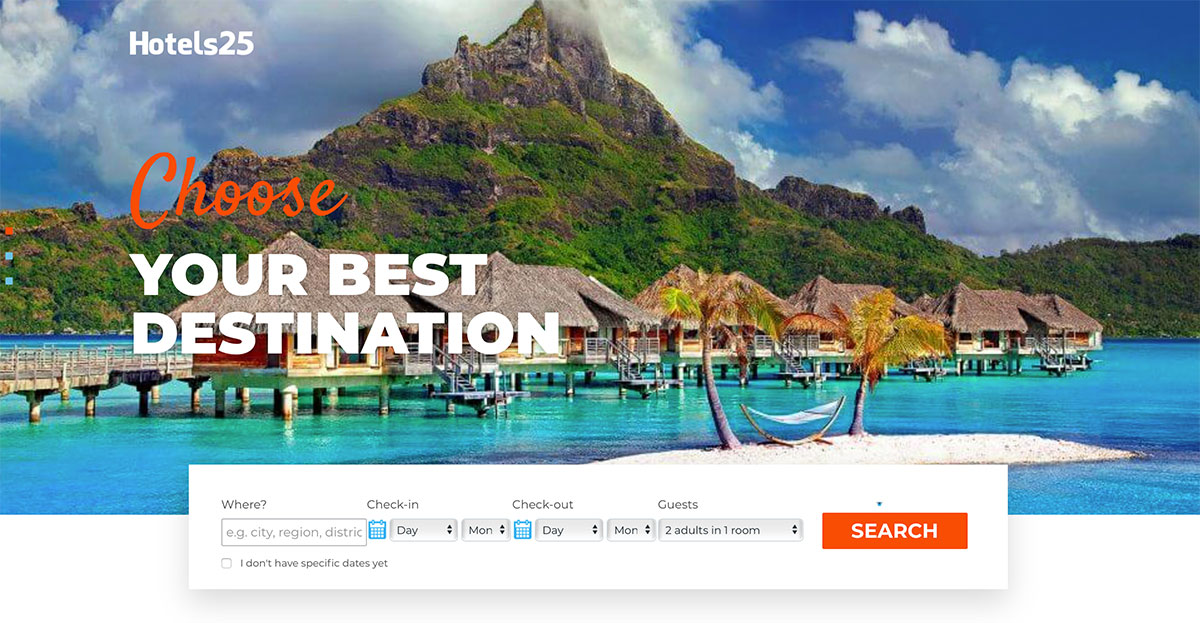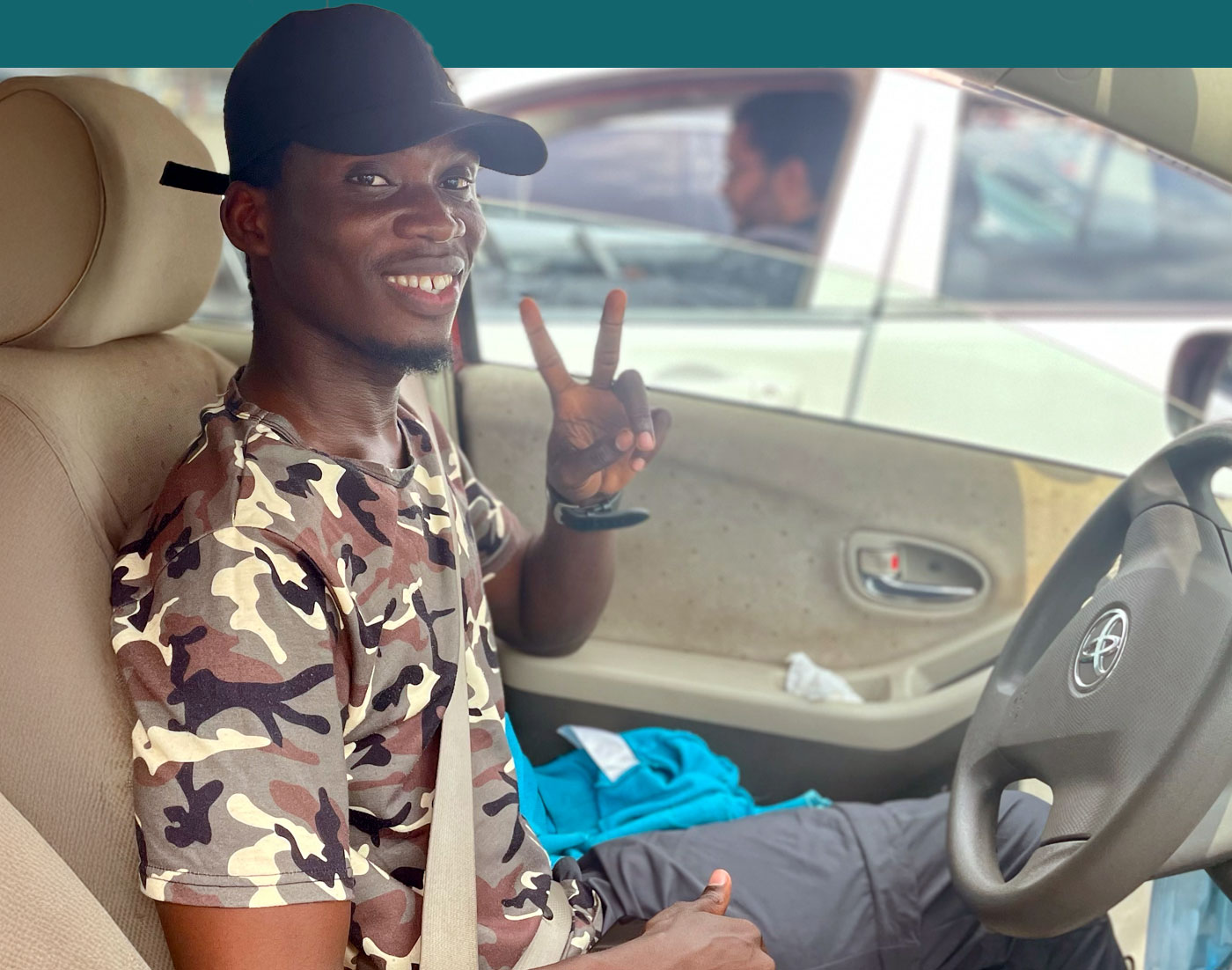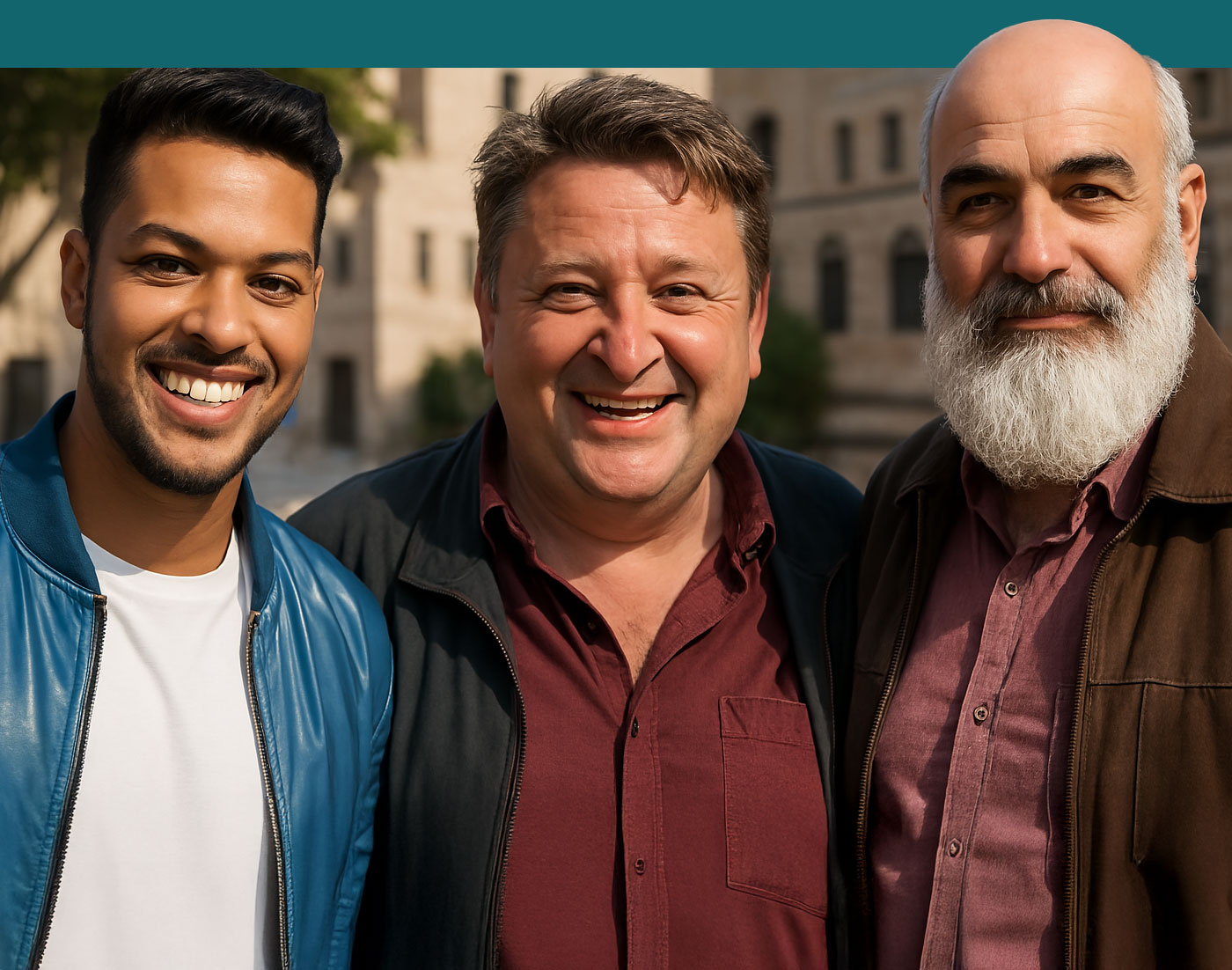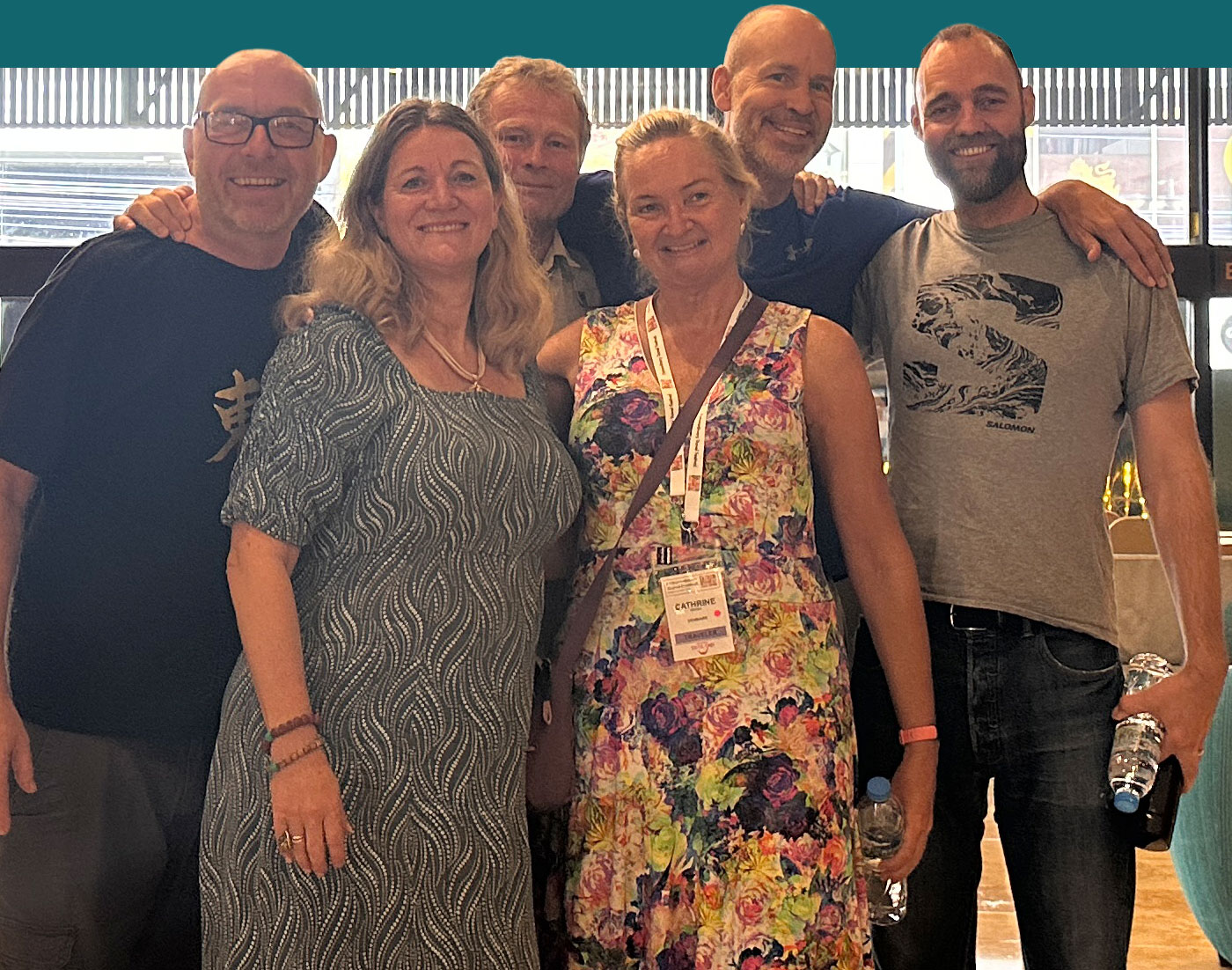In this episode we uncover the truth about the immense wealth accumulated by Yanukovych and the devastating damage caused by his corruption. You can also learn how Ukraine’s society can rebuild and recover from this dark chapter in its history.
Join me as I unveil the solution that will enable you to understand the impact of Yanukovych’s wealth and corruption on Ukraine, and discover the steps towards reconstruction and restoration. Embark on this journey with me as we explore the profound consequences of corruption and the hope for a brighter future for Ukraine.
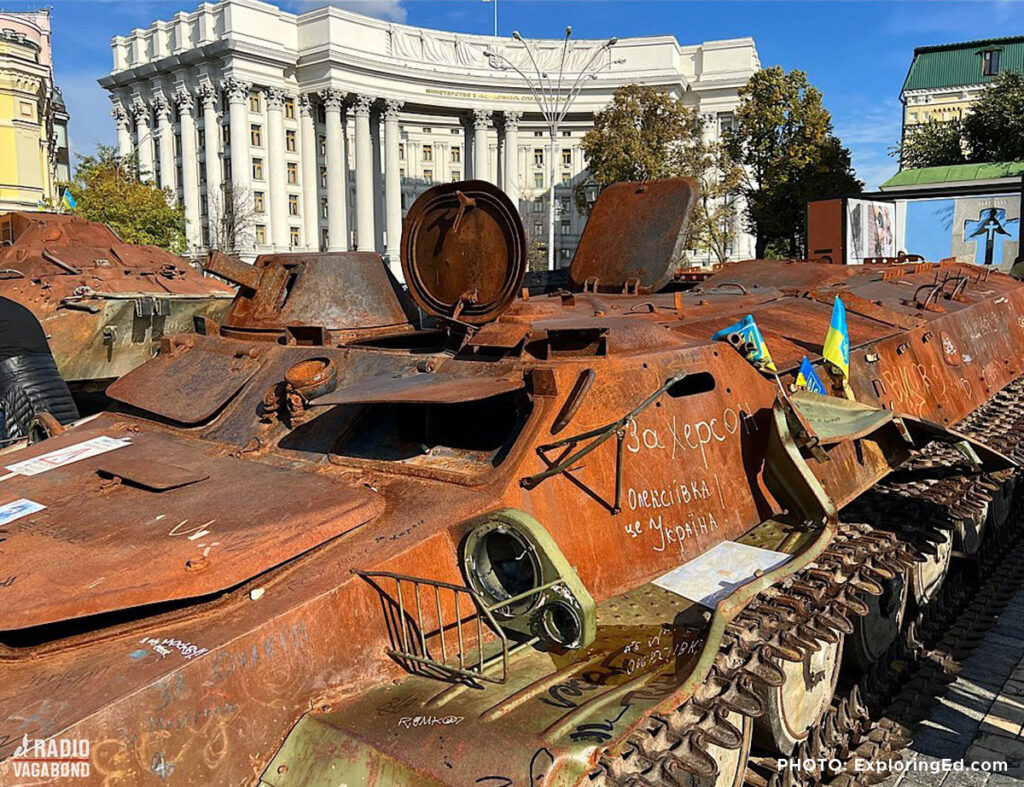
Welcome to Kyiv
Welcome to part four of this miniseries from my educational NomadMania tour to Ukraine, that I did in October. In the middle of the full-scale war with Russia. We’ve left the Kharkiv region in the eastern part of the country, and made it to the capital, Kyiv, where we’re staying at Hotel Ukraine with a stunning view of the Maidan Square – the Independence Square.
After breakfast the next day we go for a walk in the square seeing the thousands of Ukrainian flags being put there. One for each of the soldiers having died in the war. There were so many. Then we went for a walk to the nearby Mykhailivs’ka Square where there were some tanks displayed.
FACTS ABOUT KYIV
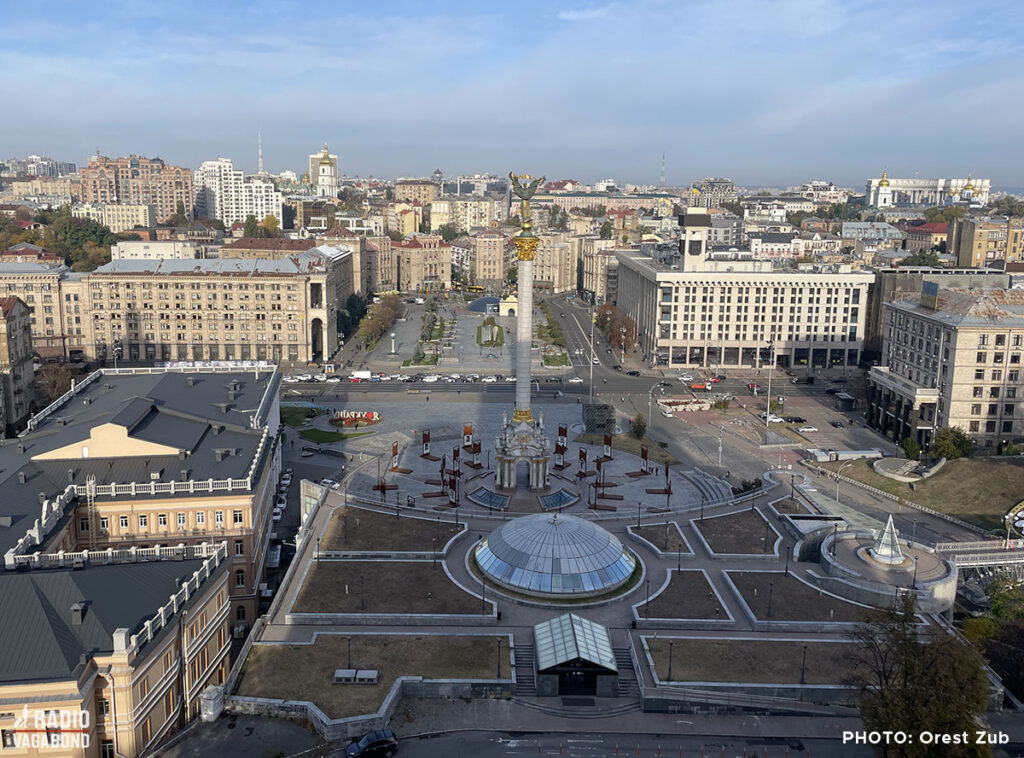
First of all, remember that it’s spelled K-y-i-v and not K-i-e-v. In fact, there’s an online campaign called KyivNotKiev to persuade English-language media and organizations to exclusively use Kyiv (the Ukrainian way) instead of Kiev (the Russian way). The campaign was started in October 2018 by the Ukrainian Ministry of Foreign Affairs and StratCom Ukraine. Also, please say [Kiiv] and not [Kiev].
Kyiv has close to 3 million inhabitants and is the biggest city in Ukraine. It’s also one of the oldest cities in Eastern Europe, with a history spanning over 1,400 years.
The city is a vibrant cultural center, boasting numerous museums, theatres, art galleries, and historical landmarks.
Kyiv showcases a blend of architectural styles, ranging from ancient churches with golden domes to Soviet-era buildings and modern skyscrapers.
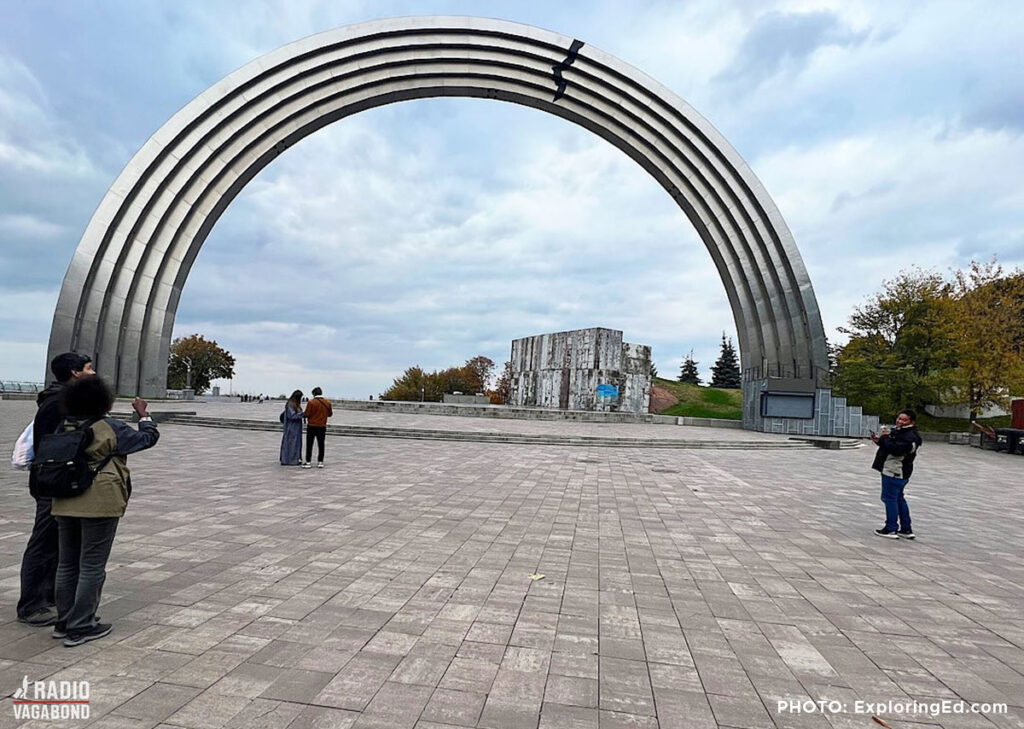
The city is situated along the banks of the Dnipro River, Europe’s fourth-longest river. The river adds to the city’s beauty and offers recreational activities such as river cruises and scenic walks along the embankments.
Maidan Square, also known as Independence Square, is a central square in Kyiv and has been the focal point for many historic events and demonstrations, including the Orange Revolution in 2004 and the Euromaidan protests in 2013-2014. More about that later.
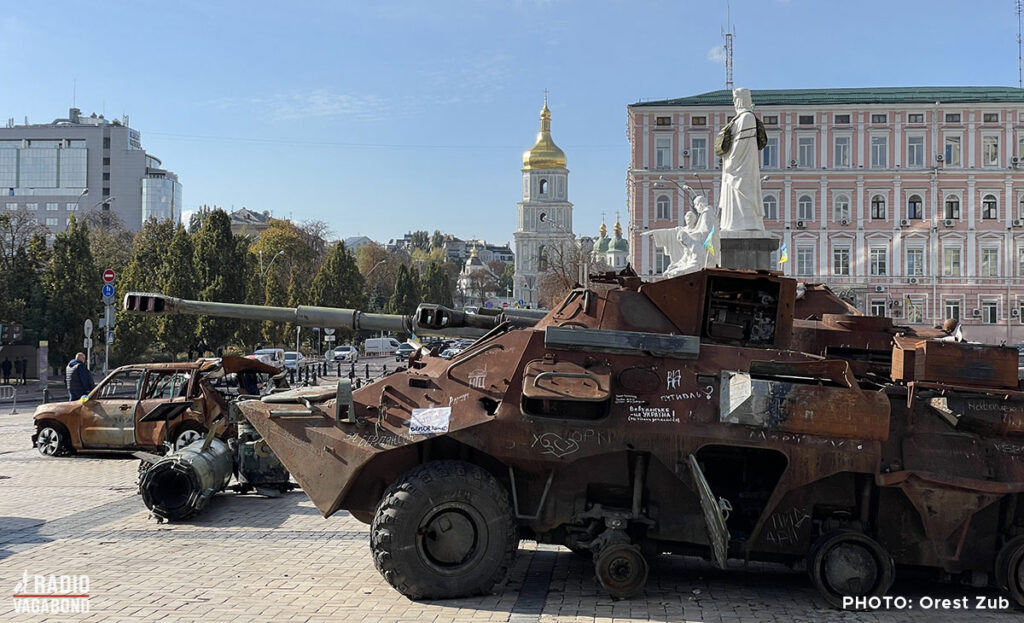
It’s known for its religious diversity. It is home to various religious sites, including Orthodox Christian churches, such as Saint Sophia’s Cathedral, as well as mosques, synagogues, and cathedrals.
One of the things that surprised me when I was here for the first time, in 2016, is how green it is. Despite it being a bustling metropolis, Kyiv offers abundant green spaces and parks, where residents and visitors can relax and enjoy nature.
Kyiv has experienced numerous conflicts throughout its history. It played a crucial role in World War II and was heavily impacted during the Soviet era, witnessing significant political changes and struggles for independence.
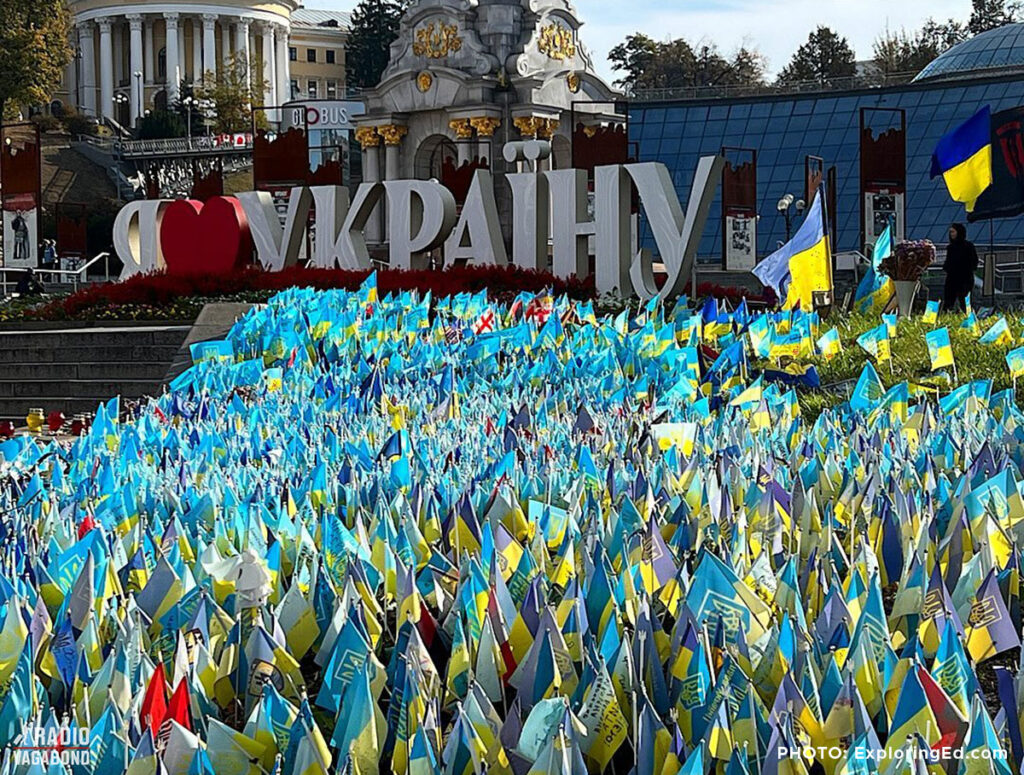
Visiting the Former President’s Estate
Viktor Yanukovych, Ukraine’s former President – a pro-Russian president who had a tumultuous tenure marked by controversy and allegations of corruption. When he was president, he managed to put a lot of money in his own pockets. He built a huge house for himself and created this huge area in a park at the river in Kyiv. And that’s where we’re going now.
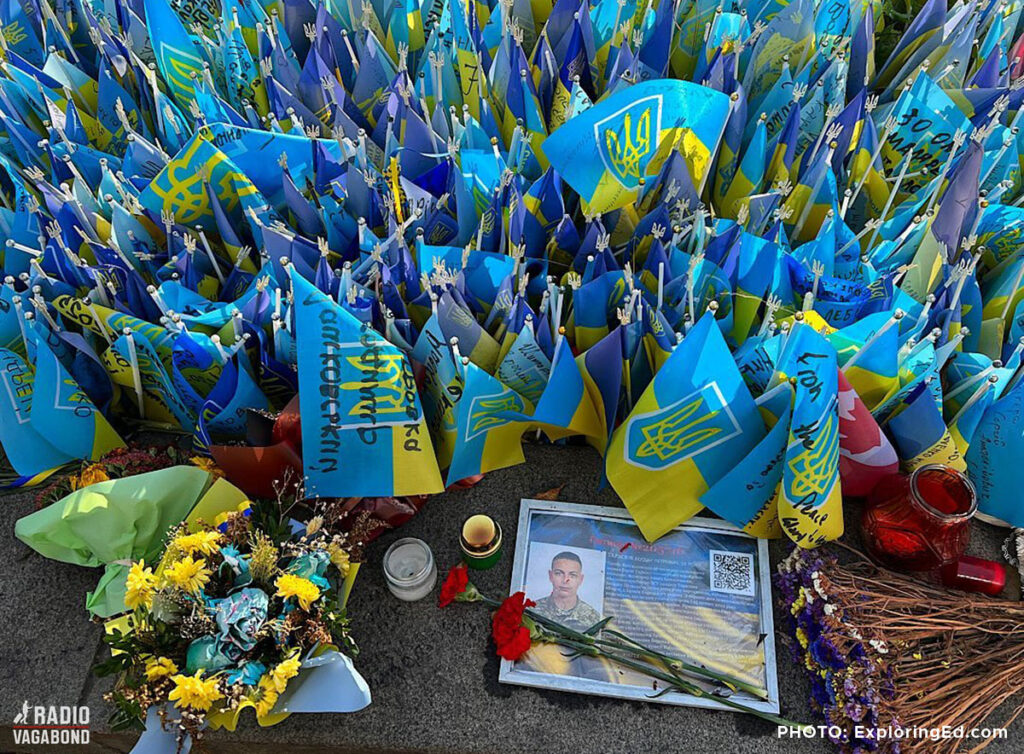
Rising from a background in the Communist Party, he faced accusations of electoral fraud during the 2004 presidential election, sparking the Orange Revolution. The opulent residence was a lavish estate that became synonymous with Yanukovych’s extravagant lifestyle and sparked controversy due to its scale and luxurious amenities.
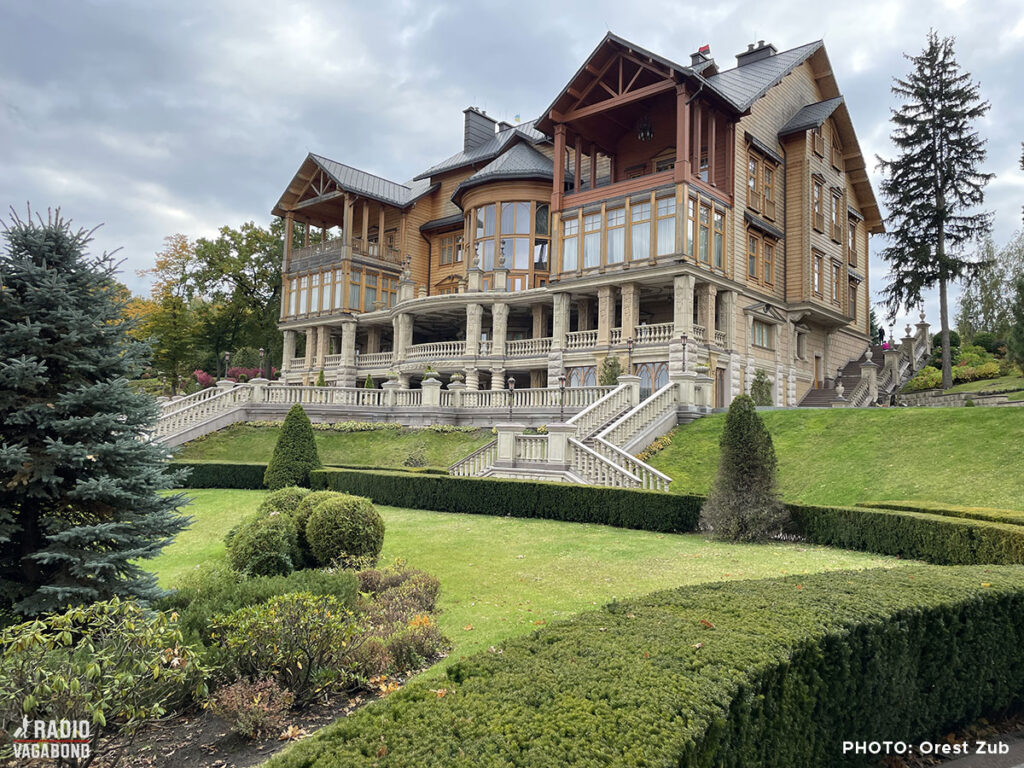
In 2010, Yanukovych won the presidency but in 2013 Yanukovych’s government rejected an association agreement with the EU. That rejection prompted widespread protests known as the. Euromaidan movement – named after the Maidan Square – the Independence Square in the center of Kyiv where we’re staying.
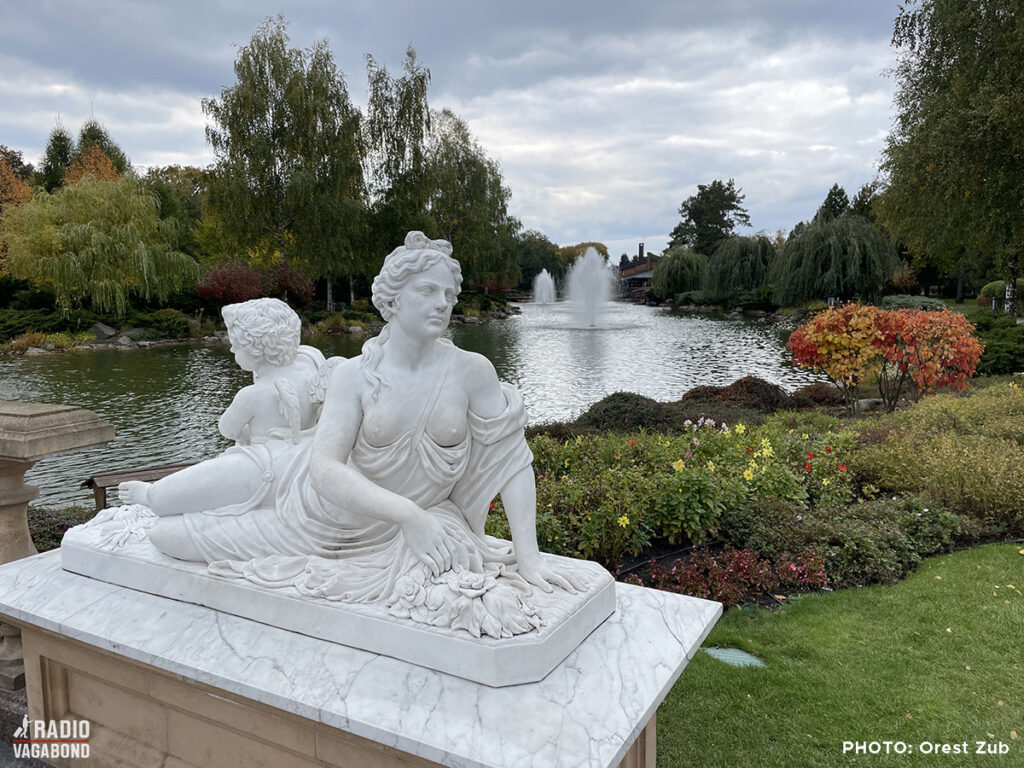
Thousands of Ukrainians gathered frequently at Maidan Square to protest against his government. It began as protests to the decision to reject this trade deal with the European Union in favour of closer ties with Russia. But they soon evolved into a broader movement against corruption, abuse of power, and demands for political reform.
In February 2014, the violence escalated dramatically. Police moved to clear the square, and the situation quickly spiralled out of control, and the police opened fire on unarmed protesters. Many were killed by gunfire and sniper attacks – even from the roof of the hotel we’re staying in. The street next to Maidan Square where all the people died is now a memorial, with pictures of all the protesters that got killed here.
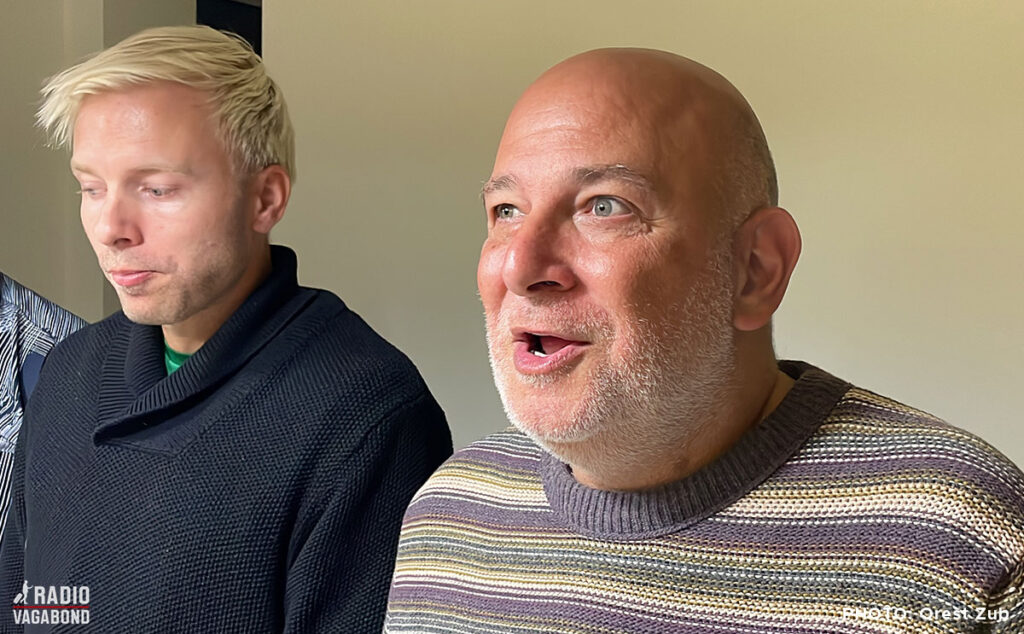
The Euro Maidan Massacre
The massacre fuelled outrage, and, in this chaos, Yanukovych fled to Russia, resulting in the Ukrainian parliament officially removing him from power. When he fled, he said that it was Nazis coming to power. Interesting to hear how his words was used again in his buddy Putin’s narrative for invading Ukraine almost 8 years later.
And as an extra little bonus fact. As far as I can see, when the war started Putin wanted to put Yanukovych back in power of the Ukrainian part of Russia – after a swift take-over. Well, that didn’t happen, and I don’t think the Ukrainian people would welcome him back to this mansion.
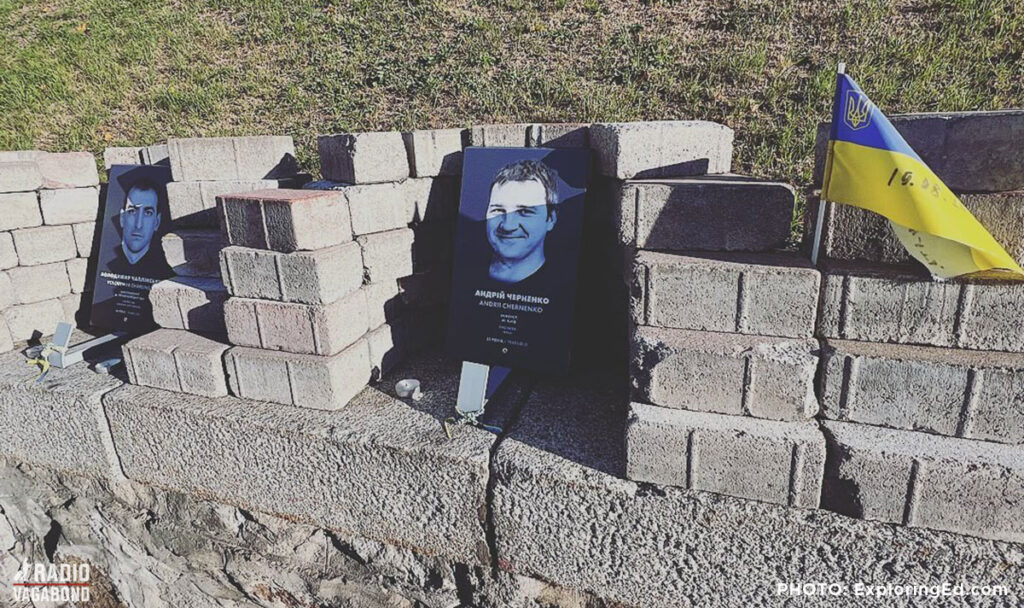
Everything a Dictator Could Wish For
The estate was originally a state-owned property used as a government residence but was later privatized and transferred to Yanukovych’s ownership during his presidency. Now it’s a tourist attraction and we went there to see it and got into a golfcart with a guide taking us around.
And it is a huge area with everything a dictator could need: a grand mansion, guesthouses, a golf course, tennis courts, a zoo, a collection of vintage cars, ornamental lakes, and lush gardens. When the people of Ukraine finally found out about the lavishness and scale of the estate, it was viewed it as a symbol of corruption and excess, especially considering the economic struggles faced by many citizens in the country. The property became a part of the public outrage during the Euromaidan protests in 2013-2014, further fuelling discontent with Yanukovych’s rule.
Museum Showing Wealth and Corruption
After Yanukovych fled to Russia in 2014, the estate was opened to the public, revealing the extravagant lifestyle of the former president. The Ukrainian government turned the area into a museum and symbol of the fight against corruption, allowing visitors like us to explore the grounds and buildings while learning about the excesses of the former regime. It attracts visitors curious to witness first-hand the crazy displays of wealth and luxury. The estate stands as a stark reminder of the challenges Ukraine faced during his presidency and the ongoing efforts to combat corruption and promote transparency in the country.
The museum of corruption stands testament to the profound corruption within the country’s governmental systems. Yanukovych unsustainable luxury, funded on the backs of hard-working citizens, was a shocking revelation for Ukrainians, further deepening their resolve for justice and transparency.
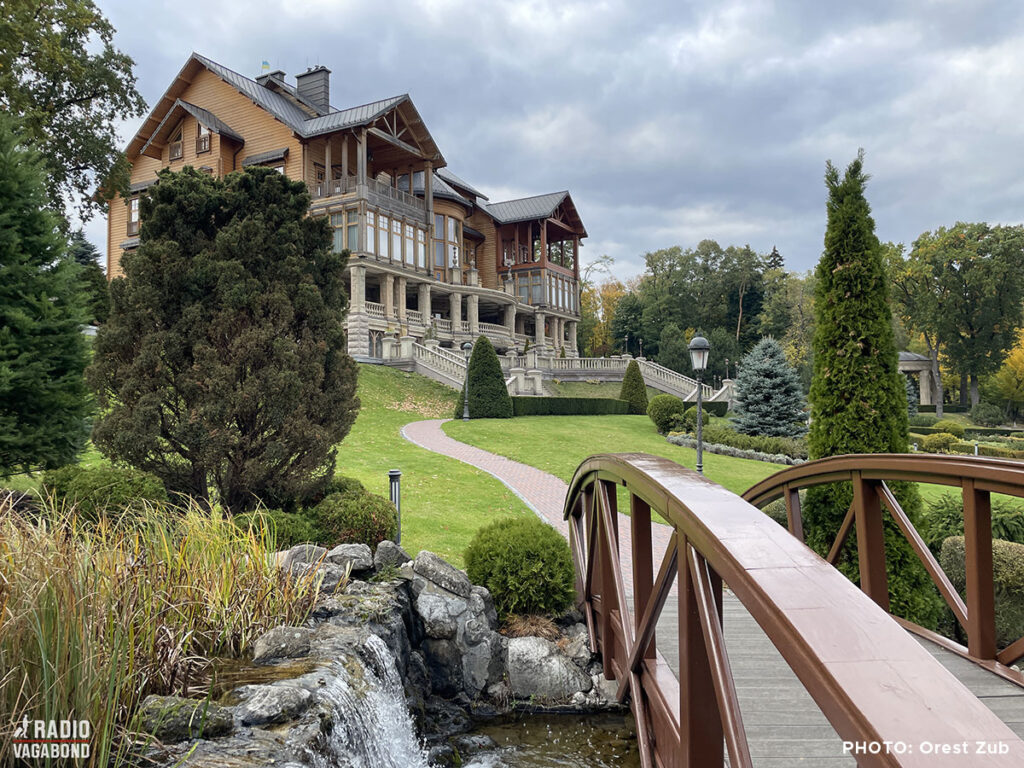
Our tour of Yanukovych’s estate pulled back the curtain on the former president’s extravagance. As we drove around in a golf cart, admiring the grandeur and opulence, I was astoned at how we was able to make this state owned place his own as a democratically-elected leader. This gives me a sense of unrest concerning the crucial need for transparency in governance.
Reflection on Zelensky’s Election
After the years with Yanukovych the Ukrainian people elected a comedian as Ukraine’s president. A surprising turn of events that sparked intrigue worldwide, raising questions on how a non-political figure would navigate the complex political landscape of Ukraine. This curiosity is mirrored by Ukrainian Orest Zub, who initially found this election bewildering. But agrees that he’s done well in a difficult situation.
Irpin: Unfolding Tragedy in Ukraine
After the visit to Yanukovych’s estate, we drove northwest to Irpin. Here we (again) got to see how the war with Russia has resulted in immeasurable suffering for Ukraine’s people, causing infrastructural damage and taking countless lives.
Irpin, a city located near Kyiv in Ukraine, that got a lot of attention during the Russian invasion of Ukraine in 2022. It was one of the areas where Ukrainian forces engaged in intense fighting against Russian forces as they attempted to advance towards Kyiv.
Watch this WISE News YouTube video where Ben C. Solomon reports here in the days of the battle. Inside Irpin: Russian Forces on Kyiv’s Doorstep.
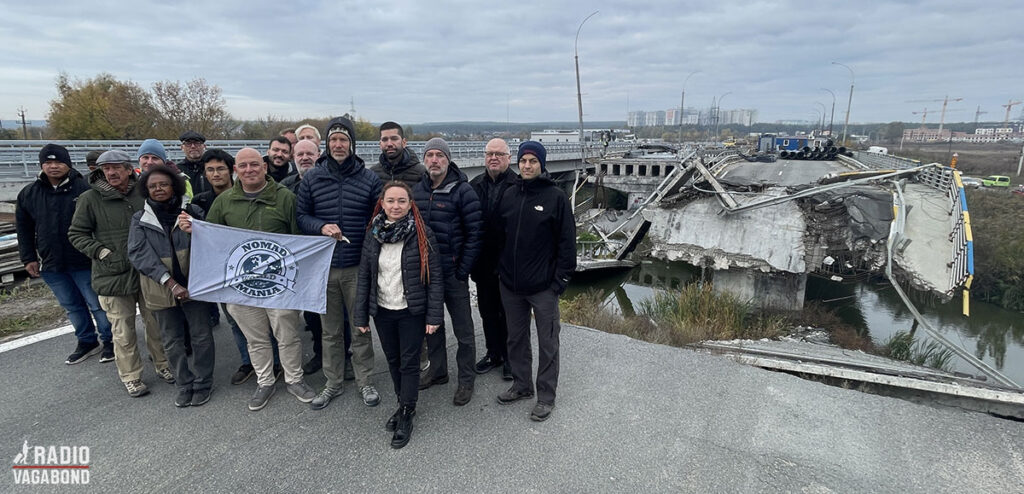
Ukraine Destroys Their Own Bridge
Irpin is located just northwest of Kyiv along the Dnieper River, and the city had heavy fighting, including artillery shelling and clashes between Ukrainian defenders and Russian forces. If the Russian troops crossed the river, it would only be a matter of time before their tanks would be rolling into the capital. So, this became a strategically important location, and Ukraine made the decision to blow up their bridge crossing the river, so the Russians couldn’t use it.
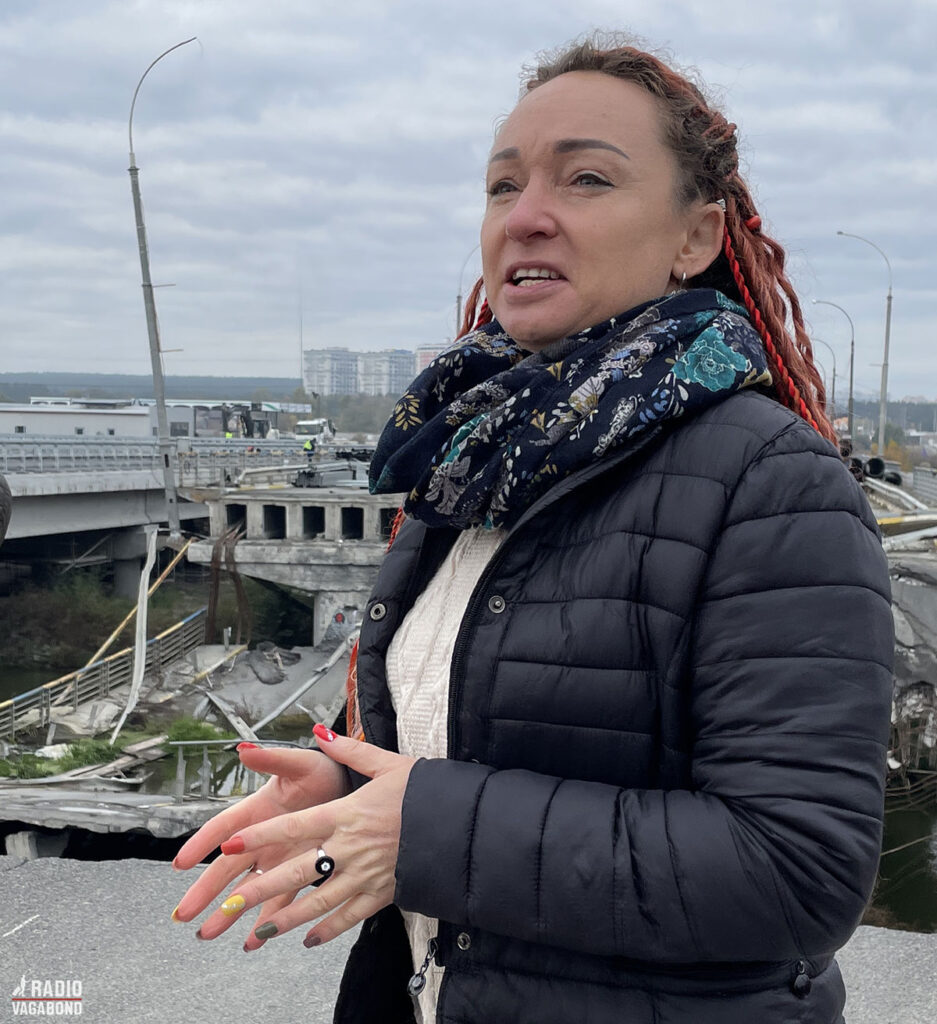
The situation in Irpin and its vicinity was part of the broader conflict that unfolded across Ukraine following Russia’s invasion. The battles and military operations were part of the efforts by Ukrainian forces to resist the invasion and protect key cities and regions from occupation. And we could see the scars even though reconstruction is well underway.
In the WISE News video Solomon walks along the street leading up to the destroyed bridge with a lot of abandoned cars. Some of them have bullet holes, most have the windows smashed in and many of them are burned completely. These cars have now been moved to a truck stop closer to the city and piled up in what is called “the Graveyard of Cars.”
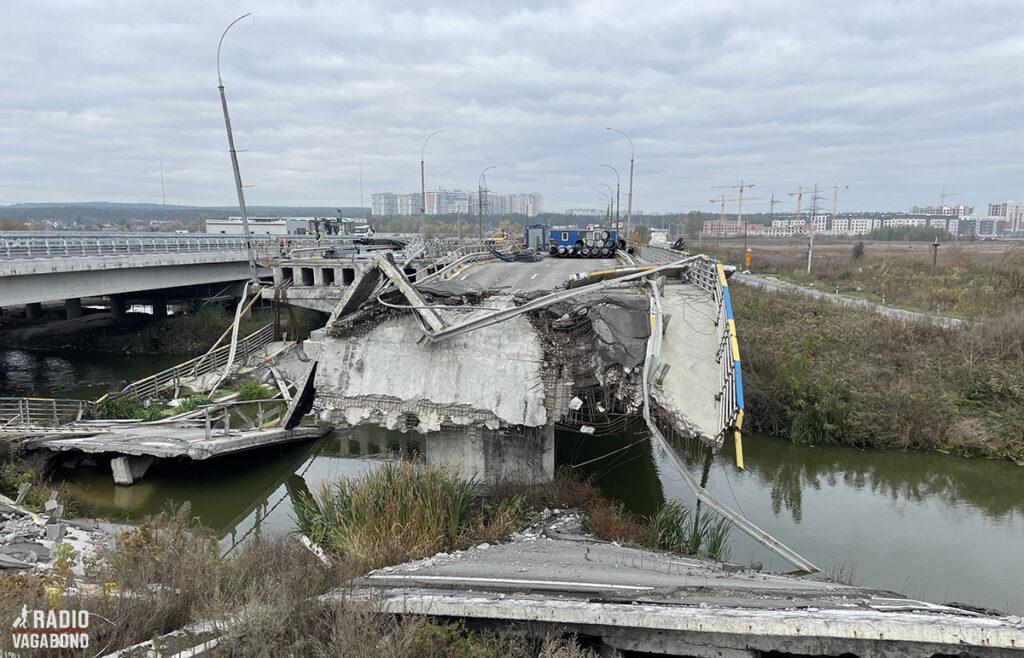
Graveyard of Cars
It’s an eerie sight to see abandoned cars, symbols of the desperation and urgency that gripped fleeing civilians during the conflict. Despite widespread destruction, the resilience of Ukrainians shines brightly in their efforts to rebuild and press forward. We feel the weight of human bravery and survival faced with adversity. It’s hard to understand the escape taken by many, who were forced to abandon their vehicles during their escape. The stories of confrontation and sacrifice create an emotional connection with listeners, offering a peerless view into the harsh realities of conflict and the enduring human spirit.
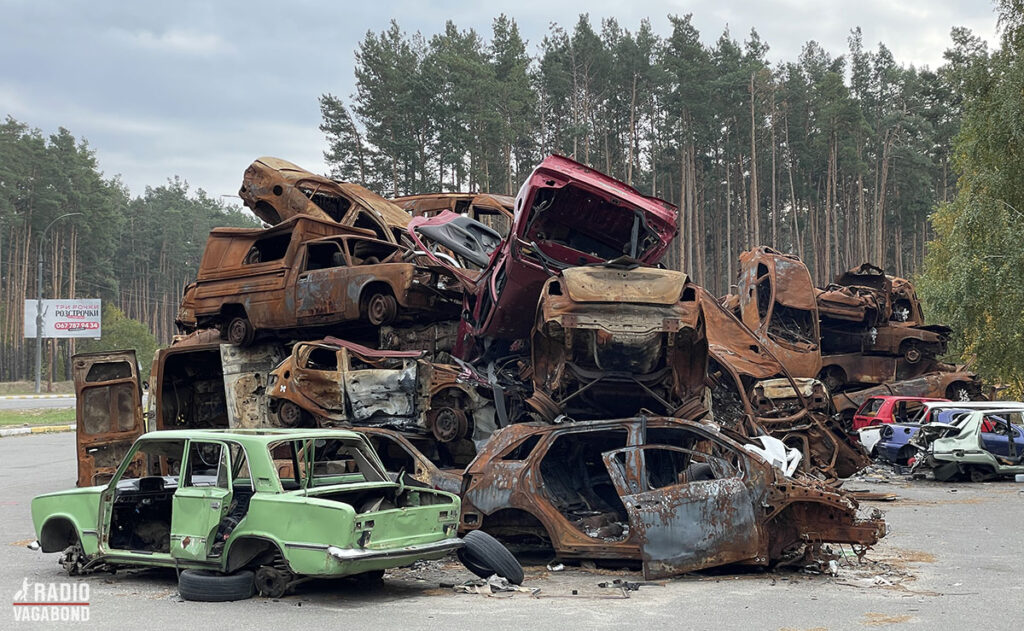
That’s it for this episode from Ukraine. I hope you found it interesting, and if you did, please share it with your friends. We still have a few more stops here in the outskirts of Kyiv before going back to Lviv in the western part of Ukraine.
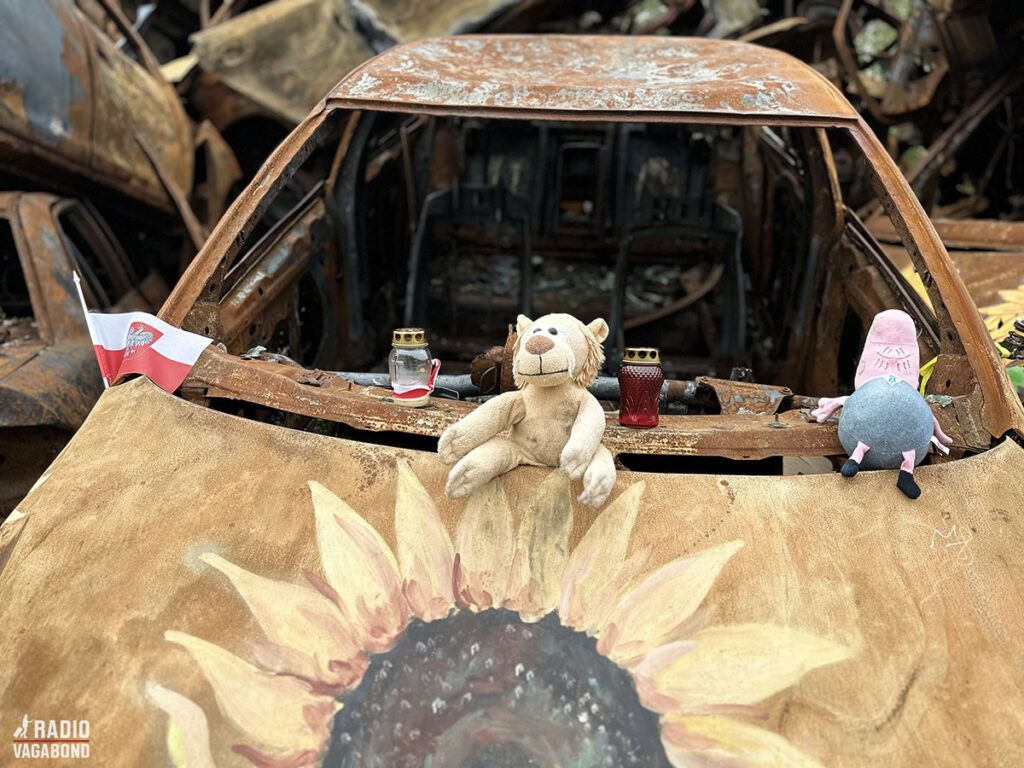
IN THE NEXT EPISODE
We’re going to Bucha and Borodyanka. You might remember those places from the news coverage. Like the massacre taking place in Bucha. A number of civilians, including women, children, and older people, were killed in the village during a violent incident by the Russian Armed Forces during the fight for and occupation of the city of Bucha as part of the Russian invasion of Ukraine. Photographic and video evidence of the massacre emerged in April 2022 after Russian forces withdrew from the city.
Here we’re going to be walking on the street that was scattered with bodies for days and visit a mass grave for the killed that’s now a memorial next to a church that now holds an exhibition with chilling photos from that time.
My name is Palle Bo, and I gotta keep moving. See you.
Timestamped summary of this episode:
00:00 – Introduction
00:37 – War Remnants in Kiev
02:19 – Facts About Kiev
05:02 – Personal Perspective on the War
09:06 – Visit to Yanukovych’s Former Residence
18:07 – Background on Ukraine’s pro-Western stance
19:46 – Evolution of the protests
22:23 – Violent crackdown and Yanukovych’s downfall
24:48 – Zelensky’s leadership and challenges
35:44 – Armed Forces Push Russians Out
36:36 – Rebuilding Residential Buildings
37:09 – Abandoned and Destroyed Cars
I WOULD LIKE TO HEAR FROM YOU!
Please tell me where are you and what are you doing as you listen to this episode? You can either send me an email on listener@theradiovagabond.com, go to TheRadioVagabond.com/Contact or send me a voice message by clicking on the banner.
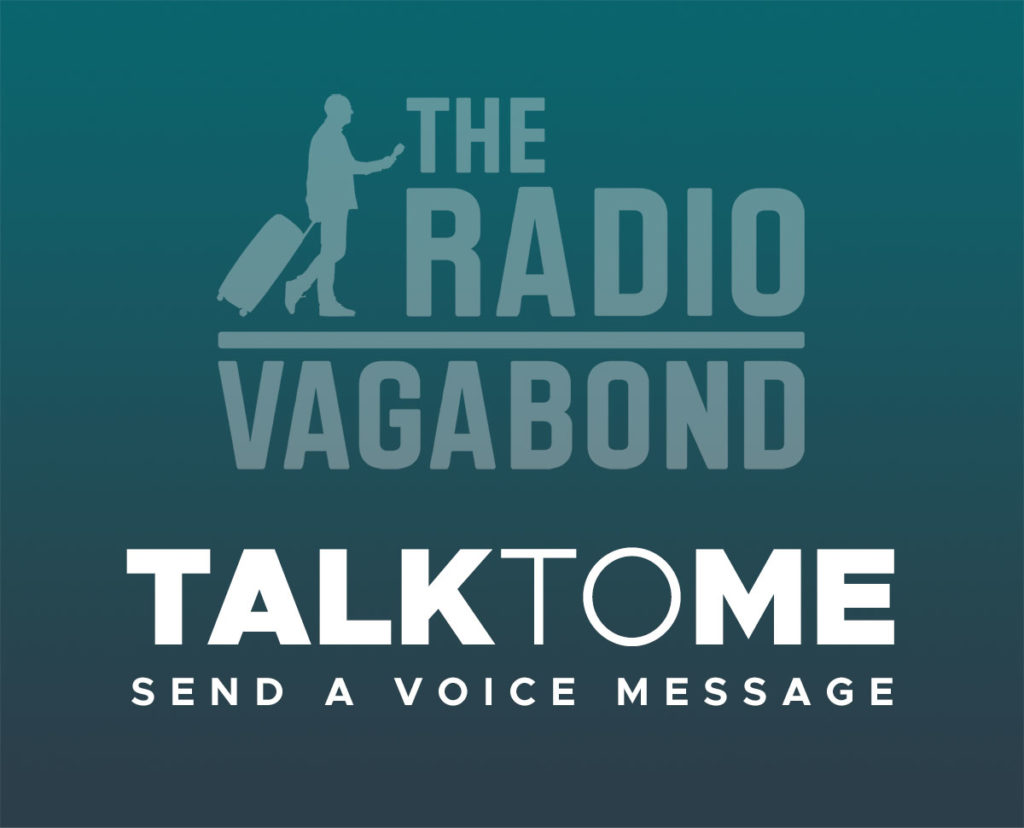
Either way, I would love to hear from you. It’s so nice to know who’s on the other end of this.
SPONSOR
A special thank you to my sponsor, Hotels25.com, who always provide me with the best, most affordable accommodation wherever I am in the world.
Hotels25 scans for prices on the biggest and best travel sites (like Booking.com, Hotels.com, Agoda and Expedia) in seconds. It finds deals from across the web and put them in one place. Then you just compare your options for the same hotel, apartment, hostel or home and choose where you book.
When you book with Hotels25, you get access to 5,000,000 hotel deals. And it’s “best price guaranteed.”
PRODUCED BY RADIOGURU
The Radio Vagabond is produced by RadioGuru. Reach out if you need help with your podcast.
